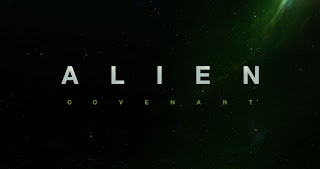When bringing attention to an upcoming film, what you choose
to unveil and put in the promotional material can be crucial in getting
audiences into cinemas. But there’s also a balance between under and
over-marketing a product that can negatively impact it on release. Alien Covenant is a great film but its advertising left me scratching my head more often than
not. The trailers and promotional material may not be as spoiler-filled and
pandering as Batman v Superman or Terminator Genysis but it’s still noticeable
for how much footage was put out before the film’s release this year. Let’s
have a look at how this happened.
Ridley Scott himself recently said that he believes Prometheus was a mistake, but was it? That depends on what you expected from
it; the 2012 sci-fi flick, in terms of advertising, swung back and forth
between prequel and not-prequel in the lead-up to release, causing some
confusion in audiences. When they finally sat down to watch it, quite a few
people were very disappointed that Prometheus wasn’t a direct prequel to Alien
but instead a means to explore the mythology of the franchise’s lore and the
engineers/space jockeys that were shrouded in mystery since the first film in
1979. Personally, I really enjoyed getting into the film five years ago, despite its dumb moments but the common audience isn’t always so easily
satisfied. They wanted the classic monster to make a return and shouted for the
director to give them just that.
So, with Alien Covenant, Scott and company decided to appease
this frustrated crowd; they reassured people right away that this would be a
true Alien film and the dreaded Xenomorphs would make a full appearance. They
nailed down the title from the off-set and set about making the film with the
monster at its centre. This also carried over into the promotions which
revealed a little too much over the past year or so. The trailers revealed a
couple of the more grotesque death scenes, some of the battle sequences and the
creature itself straddling the hood of a Covenant vehicle. More recently this was
followed by “The Crossing”, a prologue of sorts which features David and
Elizabeth Shaw bridging the gap between films while also spoiling one of
Covenant’s bigger twists. I get the sense that all this material
was put out to the public to either fill in the gaps or tide them over, to make
sure there was no doubt that Covenant would be a fully-fledged Alien movie. In
doing so, they ended up diluting some plot points and scary moments. Some of
the pre-release material doesn’t appear in the final product either; possibly
being kept back for a director’s cut or Blu-ray release.
This kind of tailoring towards audience needs has happened
before for the Alien franchise; when Alien 3 was released to a mixed reception
in 1992, the studio felt they had to make up for it somehow, despite the story
having a clear and conclusive end. Because of that mind-set and audiences not
warming to 3’s bleak tone, we got the crappy Alien Resurrection as a
consolation which went way too far with its light-hearted vibe and ended up
becoming the worst of the series. Taking on feedback and criticism is one thing
but this comes with its own balance; go too far and you risk veering off what
makes a film hit home with audiences.
Now that Ridley Scott has (hopefully!) won back the fanbase,
the next planned prequel should consider its advertising more carefully,
getting the balance right between presenting the film’s tone while not
revealing too much. The original Alien film had a masterful trailer that
perfectly encapsulated its nightmarish qualities without showing the monster
once. Perhaps the crew should take inspiration from that next time. Until then,
we’ll have to see how Covenant fares with general audiences; it’s definitely
had enough exposure to achieve success, albeit a revealing one.






No comments:
Post a Comment
Note: only a member of this blog may post a comment.